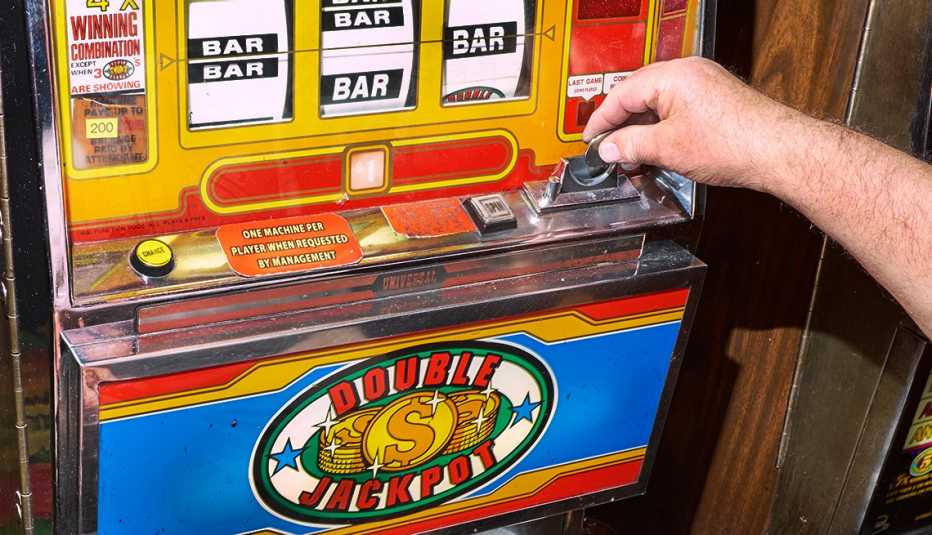AARP Hearing Center


Beauford Burton had enjoyed the occasional poker game in his youth, but in his 60s the slots hooked him. He and his wife, Sharon, started making the 2 1/2-hour drive every Friday from their home in Kings Mountain, N.C., to Harrah's Cherokee Casino Resort, where they won occasionally but lost more frequently. In one year, he lost about $50,000, nearly the equivalent of his annual salary as a manager in a textile company.
They often stayed longer than they'd intended—many times the casino would offer them a free hotel room Saturday night. Burton can't remember ever paying for a room. He had access to an exclusive bar with free drinks and food, preferred seating in the restaurants and suite upgrades in the hotel. Harrah's once flew the couple to its casino in Laughlin, Nev., and covered all their expenses—except, of course, what they gambled.
In the end, Burton knew that all of the freebies weren't really free, and that he had paid for them tenfold with his losses. "I have always known you don't get something for nothing, but I fell for it," he says. "It's the good old devil at work."
Over four years, the slots drained more than $100,000 from Burton's 401(k). But he kept playing. He cashed in a life insurance policy, took out cash advances on his credit card and gambled away Social Security checks meant to pay utility bills. Finally, in 2008, the gambling habit took his home.
By then, he was playing in a panic, betting up to $15 to $20 a spin, chasing his losses and pursuing the one illusory jackpot that he hoped would save him. "As you start to lose, you think, This is a luck thing, my luck is going to change," says Burton, now 73. "But the more you go, the more you lose. It ends up in desperation. I can see how people get so deep that it causes them to take their own lives, because it gets really, really bad."
The rise of the casinos
Of the 101 million visitors to America's casinos in 2014 (the last year for which information was available), nearly half were age 50 or older, according to data from the gambling industry. In 2014, American casinos reported over $66 billion in gambling revenue, and much of that profit came from these older gamblers.
A 2011 study published in the Journal of Gambling Studies revealed that many older adults viewed the casino as a place where they can socialize and escape from loneliness or grief.
It's never been easier for them to get to one. Long gone are the days when the twin casino meccas of Las Vegas and Atlantic City, N.J., represented the sole options for American gamblers. Regional casinos have proliferated dramatically since 1988, when the Indian Gaming Regulatory Act legalized casino development on Indian lands. That sparked a loosening of state prohibitions on gambling and a nationwide casino building boom. Today, 1,400 casinos are spread across 40 states. Regional casinos are especially attractive to those who prefer to drive themselves and do not want to have to spend the night. States with large populations of adults over 65, including Florida, Pennsylvania, New York, Michigan, Ohio, Massachusetts and West Virginia, have all expanded casino gambling in recent years.
Addiction experts alarmed
Older adults are an especially desirable demographic for the gaming industry because they fill the floors during off-peak hours, and casinos market to them aggressively, offering discounts on breakfast and lunch, free drinks and guarantees to "instantly win up to $1,000 Free Slot Play!" They stage free daytime entertainment such as polka dancing, magic shows and live "Golden Oldies" shows. The "third of the month club" provides complimentary shuttles from senior centers and retirement housing complexes on the day they receive their Social Security checks. Some casinos stock their bathrooms with adult diapers and disposal receptacles for diabetics' needles. They provide wheelchairs, walkers and more handicapped parking spots than a hospital. One Nevada casino operated an on-site pharmacy—since closed—where accumulated play credits could cover the standard $25 copay on medications.
The gambling boom—and the aggressive tactics the industry uses to lure older patrons—has alarmed addiction experts. Even casino patrons with no history of problem gambling can develop addictive behavior as they age. According to a 2005 study by David Oslin, a professor of psychiatry at the University of Pennsylvania Medical Center in Philadelphia, 1 in 11 adults over age 65 bet more than they could afford to lose in the previous year. The study suggests that more than 4 million older Americans could have a gambling problem. "That's a higher rate than we have for most diseases," he says.



































































More on Scams and Fraud
Older Investors Lose Millions Buying Overpriced Gold, Silver
Many victims urged to drain nest eggs to fund inflated purchases
Phone Scams
How to identify and avoid common phone scams
Online Romance and Dating Scams: How to Spot a Scammer
Online romance and dating scams